|
|
|
Sort Order |
|
|
|
Items / Page
|
|
|
|
|
|
|
| Srl | Item |
| 1 |
ID:
082480
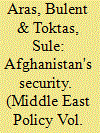

|
|
|
| 2 |
ID:
078943
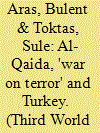

|
|
|
|
|
| Publication |
2007.
|
| Summary/Abstract |
The new wave of international terrorism gained strength in the aftermath of the 9/11 attacks, threatening not only the USA and its allies but also, as seen in the latest incidents, a significant part of the world. Continuing al-Qaida attacks signify the vulnerability and weakness of defence, security and intelligence systems in the face of the new international terror. The terror network has created an image of a postmodern virtual state. We argue that it has been shaped by a common ideology rather than in physical terms. Thus it is necessary to develop novel approaches. In this article we discuss Turkey's struggle against the new terror, underlining the fact that it is a Muslim majority state and has lively and dynamic Islamic traditions and different shades of Islamic belief. This situation makes the discussion more interesting, focusing on the position, perception, difficulties and struggle of a Muslim state with a democratic and secular mode of government vis-à-vis an allegedly Islam-inspired international terror network. There is an urgent need to develop an international terror strategy to counter terror attacks against Turkey, Britain, Egypt and others. We underscore the vital requirement of reconciling the macro-schemes and priorities of the global 'war on terror' with the national conditions and needs of the other countries involved in the struggle against the terror network.
|
|
|
|
|
|
|
|
|
|
|
|
|
|
|
|
| 3 |
ID:
091869
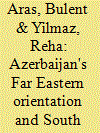

|
|
|
|
|
| Publication |
2009.
|
| Summary/Abstract |
This paper focuses on Azerbaijan's outreach toward East Asian countries and its relationship with South Korea. Despite their geographical distance from Azerbaijan, countries in the Far East, especially China, Japan, and South Korea, have demonstrated an interest in engagement and explored potential avenues of cooperation. Azerbaijan established support for its political priorities and for its stance on the Karabakh issue as prerequisites and confidence-building measures for potential investors. East Asian states easily fulfilled these two criteria, due to their geographical and ideological distance from the political dynamics of the Caucasus. South Korea showed a genuine concern for Azerbaijan's national interests and problems and played a key role in its economic development. While South Korea was a latecomer, mutual political trust and fruitful economic relations were quickly established. The Azeri administration has entrusted South Korean public and private investors with many significant current and future projects in the oil- and non-oil-related fields. This paper concludes that these projects are indicators of the central role that South Korea will play in Azerbaijan's future.
|
|
|
|
|
|
|
|
|
|
|
|
|
|
|
|
| 4 |
ID:
076101
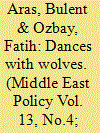

|
|
|
| 5 |
ID:
149442
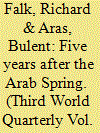

|
|
|
|
|
| Summary/Abstract |
A new political geography has emerged in the Middle East and North Africa (MENA) after the Arab Spring. The transformative impact of the popular upheavals appeared to put an end to long-term authoritarian regimes. Today, the region is far from stable since authoritarian resilience violently pushed back popular demands for good governance and is pushing to restore former state structures. However, the collective consciousness of the popular revolts endures, and a transformative prospect may emerge on the horizon. The chaotic situation is the result of an ongoing struggle between those who seek change and transformation and others in favour of the status quo ante. A critical evaluation of the Arab Spring after five years indicates a continuous process of recalculation and recalibration of policies and strategies. There are alternative routes for an eventual settlement in the MENA region, which are in competition against both regional and transregional quests for a favourable order.
|
|
|
|
|
|
|
|
|
|
|
|
|
|
|
|
| 6 |
ID:
083351
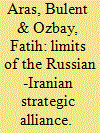

|
|
|
|
|
| Publication |
2008.
|
| Summary/Abstract |
The Russian and Iranian governments define their relations as "very close" and "strategic" in many areas. The frontiers of this cooperation, in geopolitical terms, include the south Caucasus, central Asia, Afghanistan, and the oil- and natural gas-rich Caspian basin, while, at the issue level, the cooperation includes the nuclear issue, disarmament, the struggle against terrorism, the Iraqi quagmire, the Palestinian problem, and the U.S. military expansion into Eurasia. The signs of cooperation in these areas are, among others, regular political dialogue and similar attitudes in refusing to include the Lebanese Hizballah on terrorist lists, pursuing political relations with Hamas, maintaining a pro-Arab position on the Arab-Israeli question, objecting to foreign military engagement in Eurasia, and having a common voice during the Israeli-Lebanese conflict in 2006. However, we need to discover the nature of these relations in order to decide whether the close Russian-Iranian relations can be described as a strategic alliance. What is the strategic depth of Russian-Iranian relations? Do the relations consist merely of the conjectural necessities of the post-Cold War period? What are the "red lines" in Russian-Iranian relations? This article analyzes the relations between these two countries from a broader perspective, to examine the meaning of the relations in bilateral, regional and international contexts
|
|
|
|
|
|
|
|
|
|
|
|
|
|
|
|
| 7 |
ID:
046613
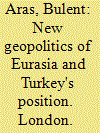

|
|
|
|
|
| Publication |
London, Frank Cass, 2002.
|
| Description |
viii,110p.
|
| Standard Number |
0714681229
|
|
|
|
|
|
|
|
|
|
|
|
Copies: C:1/I:0,R:0,Q:0
Circulation
| Accession# | Call# | Current Location | Status | Policy | Location |
| 045887 | 327.1095/ARA 045887 | Main | On Shelf | General | |
|
|
|
|
| 8 |
ID:
047965
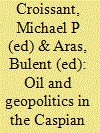

|
|
|
|
|
| Publication |
London, Praeger, 1999.
|
| Description |
xx, 305p.
|
| Standard Number |
0275963950
|
|
|
|
|
|
|
|
|
|
|
|
Copies: C:1/I:0,R:0,Q:0
Circulation
| Accession# | Call# | Current Location | Status | Policy | Location |
| 043434 | 333.823209479/CRO 043434 | Main | On Shelf | General | |
|
|
|
|
| 9 |
ID:
018770
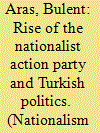

|
|
|
|
|
| Publication |
Winter 2000.
|
| Description |
48-64
|
|
|
|
|
|
|
|
|
|
|
|
|
|
|
|
| 10 |
ID:
139197
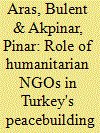

|
|
|
|
|
| Summary/Abstract |
This article illuminates the role of international HNGOs in Turkey's peacebuilding. Turkish HNGOs pursue low-level peacebuilding, focusing on interaction with grassroots, as opposed to the high-level peacebuilding of the state based on official interaction. Despite being independent, at times they become subsumed by the discourse, priorities and policies of the government and develop an interest in shaping official policies which carry the risk of politicizing the aid. While some of their key features such as flexibility, absence of conditionality, ensuring sustainability, relying on private donations and pursuing advocacy follow the mainstream peacebuilding lines, others such as culture and religion as catalysts and representing and promoting Turkey abroad demonstrate a deviation. Although the institutional consolidation of these HNGOs as a sector remains a distant goal, they are not likely to disappear given the considerable societal and political will behind their work. Their success depends on building a comprehensive strategy with efficient coordination and cooperation in a pluralist environment.
|
|
|
|
|
|
|
|
|
|
|
|
|
|
|
|
| 11 |
ID:
136209
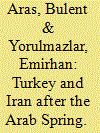

|
|
|
|
|
| Summary/Abstract |
When the political landscape in the Middle East appeared on the brink of transforma
tion back in early 2011, Turkey and Iran, for different reasons, were delighted. Each envisioned an exten¬sion of ito national sphere of influence. Both Ankara and Tehran declared them¬selves the standard bearers for "demo¬cratic" rule and civilian empowennent. For Ankara, this regional transformation was, in the words of Foreign Minister Ahmet Davutoglu, a “normalization" process —a quest for good governance and integra¬tion into the international community. The tide was thought to be turning towards the eclectic Turkish model, a combination of local traditions with the universal practices of democracy, humen rights and a market economy. A series of early events seemed confirm that the Turkish model for po-litical conciliation and regional economic integration wu emerging the new politi¬cal none in the Middle East.
|
|
|
|
|
|
|
|
|
|
|
|
|
|
|
|
| 12 |
ID:
121177
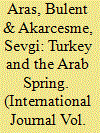

|
|
|
| 13 |
ID:
067335
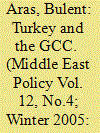

|
|
|
| 14 |
ID:
079856
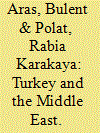

|
|
|
| 15 |
ID:
165301
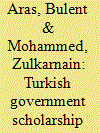

|
|
|
|
|
| Summary/Abstract |
Turkish policy makers assume a soft power dimension in foreign policy. A number of soft power tools and instruments have been adopted, including state-sponsored educational scholarship programs targeted at international students. This study examines the role of the Turkish government scholarship program (Türkiye Bursları) in generating and disseminating Turkey’s soft power. Through the use of a mixed methods research approach, the study identifies both the importance of the program and the challenges confronting it. By the means of providing higher education scholarships, Turkish government made some progress in publicizing and diffusing its culture and making itself more attractive to international players. There is also the need for reforms to enhance the competitiveness of Türkiye Bursları in relation to other scholarship programs across the globe.
|
|
|
|
|
|
|
|
|
|
|
|
|
|
|
|
|
|
|
|
|